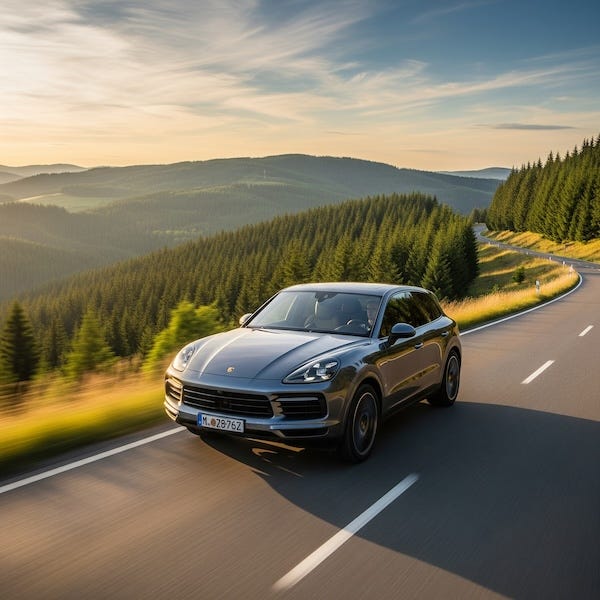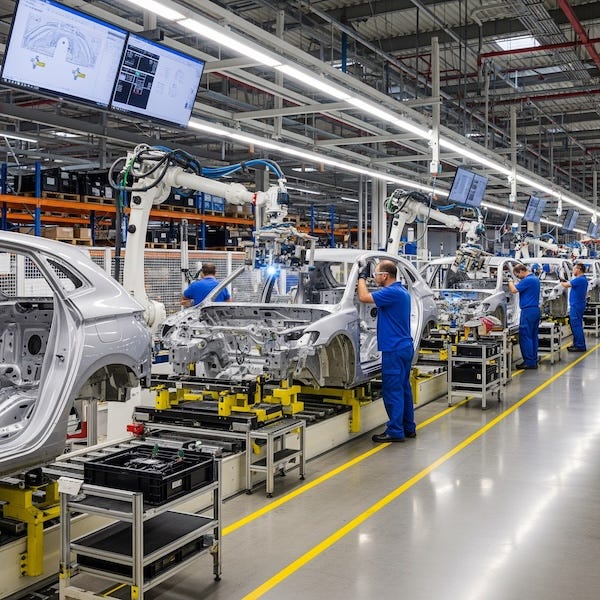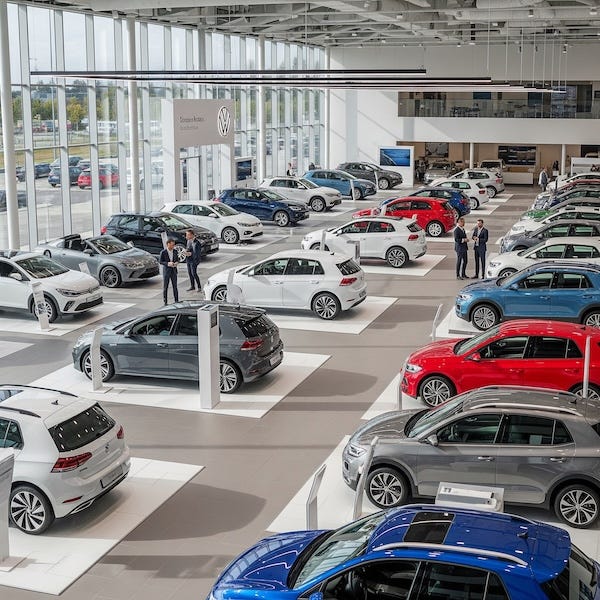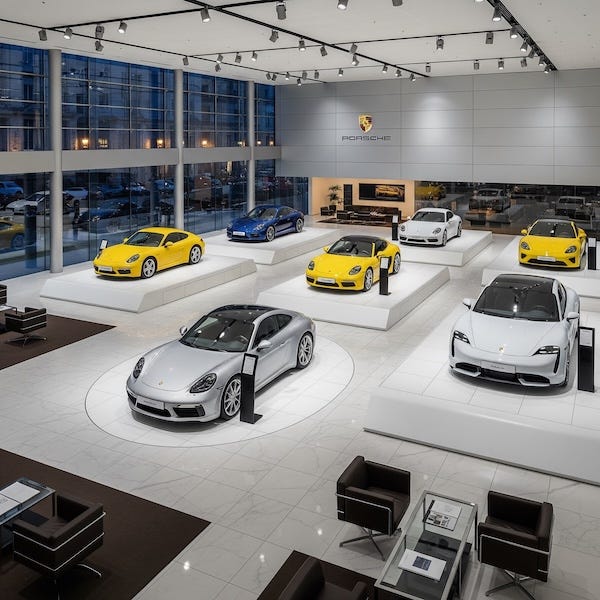Porsche makes fast cars.
Until recent decades, fast car-making companies were small.
Aston Martin. Lamborghini. Ferrari. Many others.
Porsche too was one such car maker.
They had small operations, low volumes, and high margins.
Such companies tend to rely on outside support to keep running their business. They do some core things themselves and outsource most other functions.
Throughout Porsche’s history, they too had been doing this.
Their engine and gearbox was legendary. Their suspension tuning was excellent.
But other bits were given to other more experienced companies.
In Porsche’s case, that company was Volkswagen, or VW.
Right from the early days, since the first few Porsche cars rolled out, VW was a significant partner.
Towards the end of the 20th century, many such sportscar makers were in trouble. Sales were dwindling in tough economic times.
Some shut down. Many were acquired by bigger companies.
Porsche was different. They did something no sportscar maker wanted to do.
They made an SUV. The Porsche Cayenne.
Back in the early 2000s, a Porsche-made SUV was blasphemous. Absolutely un-thinkable and unacceptable.
That’s what the industry folks and journalists said.
Customers though loved it. And the SUV sold by the thousands.
The Porsche Cayenne SUV saved Porsche from going bankrupt. It made the company immensely profitable with healthy profit margins.
This meant that Porsche could continue making their sportscars.
Underneath the SUV was however a problem. A deep and fundamental risk.
To address this risk, Porsche came up with a plan.
The plan leads us to the story of how Porsche attempted a massive hostile takeover of VW, resulting in hedge funds losing money, and oddly — VW taking over Porsche!
The Porsche-VW Love Story
Porsche depended on VW for making many parts of their cars including body panels, chassis, suspension, and sometimes even critical components like the engine itself.
This was before the Cayenne SUV was designed.
Once the SUV came to be, Porsche was even more dependent on VW for parts and manufacturing.
Without VW, Porsche would cease to exist.
VW around that time was an extremely mis-managed company.
Their profit margins were extremely low. They made hundreds of thousands of cars every year and yet struggled to make enough money.
Porsche thought about this situation.
An idea came to their management. What if Porsche acquired VW?
Porsche would gain stability as one of their biggest suppliers would be under their control.
And since they thought they were better at running a car company, they could re-structure and improve VW’s profit margins.
There was one problem.
VW was a much bigger company than Porsche. How could they take over VW?
This is where a genius plan was hatched.
Porsche’s Takeover of VW
In 2005, Porsche started buying VW’s shares in the stock markets.
They had bought nearly 20% of VW that year.
When asked publicly, Porsche said they had no plans to take over the company. They just wanted to help keep one of their biggest suppliers independent.
VW’s share price was well supported and rising because of Porsche’s buying. That’s how much Porsche was buying. They were spending billions to buy Porsche shares.
Keep in mind that VW was one of the least profitable car companies in Europe.
By the end of the year 2007, Porsche owned over 30% of VW. Their continued buying had doubled VW’s share price over this period.
But this share price was unsubstantiated. The share price was high only because Porsche was buying shares.
The stock, according to some big investors, was extremely overvalued.
What do hedge funds do when a stock is overvalued?
They expect the stock price to crash. And when they expect a crash, they try to make a profit from it — by shorting the stock.
Some American hedge funds started shorting the VW stock. The short positions grew and some hedge funds even took loans to be able to short the VW stock.
The short position got so big, that about 12% of all VW shares were being shorted.
They were sure this stock would crash.
In the second half of 2008, Porsche announced they had bought even more shares of VW. They owned about 42% of the company.
That would still be okay.
But then, it came to light that Porsche didn’t just own 42% of VW shares. They had bought VW stock options worth about 31% of the company.
What this meant was, Porsche already owned 42% of VW. And they could easily buy more than 31% of its shares at a fixed price using the options they had bought. This would mean Porsche could end up owning about 74% of VW.
Now here’s where it gets extremely thrilling.
20% of VW were locked – they are owned by the government of Germany. They were not interested in trading with these shares.
So, these shares were unavailable in the markets.
5% were with index funds. So effectively, even those shares were unavailable.
This left about 1% of VW shares in the open market.
The hedge funds had shorted VW shares. That was worth about 12% of all shares.
But – only 1% was available in the markets.
Since the share price had not fallen as predicted by hedge funds, they were about to lose their bet.
They would have to buy shares in the open market and return (you can read more about shorting stocks if this is not clear to you).
Since the short sellers were now trying to buy stocks (only 1% of stocks were available in the markets), the stock price rocketed up.
It went from about $200 to $1,000 dollars in a day.
VW became the world’s most valuable company for a short period of time because of this.
The hedge funds lost their money. And Porsche was sitting on about $11 billion in gains!
Masterstroke.
Not So Fast
It was not a masterstroke.
Not yet.
You would imagine that if you owned more than 50% of a company, you would have control over it.
But not VW.
VW was protected by a law that said for anyone to have controlling rights over the company, they needed to own more than 80% of the company. But 20% was owned by the government. And they were not going to sell.
There was another problem.
Porsche did not own 74% of VW.
They owned about 42%. And the rest was options – they had the option to buy the remaining 31%.
How did they buy these options? $13 billion in loans.
This is 2008 we are talking about. The moment the Great Recession hit, the banks became uncomfortable. They started demanding Porsche pay back the loans.
And Porsche did not have $13 billion lying around.
Porsche came up with an idea.
If they could somehow take over VW, they could use VW’s money to pay off this loan.
VW had about $14 billion cash. If Porsche controlled VW, they could use this $14 billion however they wished to.
But, no banks were willing to loan even more money to them — it was a bad economic climate.
They were stuck in a sticky situation.
Problem Solved
Porsche had to find a way to pay back its loans.
It managed to convince Qatar based investors to invest in Porsche. This would help them take over VW.
But as the rule said, 20% of VW was with the government and they would not allow it.
And then, VW went to the Qatar investors and convinced them to invest money in VW instead of Porsche!
Porsche was left without control of VW (despite owning so many shares in VW) and with a massive debt.
And now comes the solution to the problem.
The unbelievable: a complete U-turn.
VW now approached Porsche and proposed a takeover – a merger, rather.
A deal was finalised allowing VW to merge with Porsche and take over the company at a future date.
The Qatar investors got a stake in this merged company for their investment. Porsche came under the VW. And the loan was taken care of.
The VW group of companies already owned many of the biggest car brands in the world — Audi, Lamborghini, Bugatti, Bentley, Skoda, Scania… the list is quite long.
After this episode, Porsche too joined this group.
The complete merger was finished by 2012.
Very complicated?
Yes — and this is the simplified version.
Actually, VW owns Porsche AG (car making company).
But Porsche SE (the holding company controlled by the Porsche family) owns a big chunk of VW.
So, Porsche SE owns VW and VW owns Porsche AG. We’ll skip that complicated bit here.
There are no simple lessons here. There can be many lessons.
The most obvious lesson is that the stock markets can be very peculiar and complicated.
The other lesson is that mergers and acquisitions can happen smoothly, or can happen in a hostile and messy manner.
And also that nothing is as easy to predict as it seems.
Of course, there’s the fact that debt is a double edged sword. It can help you do things you otherwise would never be able to do.
It can also harm you more than if you didn’t have it.
How would things have turned out if the 2008 recession had not hit?
Would Porsche be able to get more loans and buy off VW?
If your answer is “I can’t say”, you’re absolutely right.
Who knows what other things could have happened. That’s a lesson too.
The Porsche and VW merger worked out well.
Porsche has been making some fantastic cars since. So has VW.
Quick Takes
+ India’s unemployment rate fell to 5.2% in July (vs 5.6% in June). Rural unemployment rate stood at 4.8% while urban unemployment rate was 6.8%.
+ The government proposed GST reforms, simplifying the 4 existing GST slabs — 5%, 12%, 18%, 28% — into just two (5% and 18%). A special 40% ‘sin tax’ will apply to luxury items and harmful items like tobacco.
+ Knowledge Realty Trust REIT was listed on the stock exchanges at a premium of 3% over its issue price and closed 6.24% up at the end of the day.
+ Clean Max Enviro Energy Solutions applied for a Rs 5,200 crore IPO with SEBI.
+ India has suspended the 11% import duty on cotton from 19 Aug to 30 Sept, to ease costs for the garment industry after the US tariffs on Indian goods.
+ Overseas assets of Indian mutual funds fell 5.6% to $8.3 billion and foreign liabilities rose 19.9% to $30.5 billion in FY 25 according RBI data. This means mutual funds in India invested less abroad but received more money from foreign investors.
+ The central government approved the construction of a 6-lane Capital Region Ring Road (Bhubaneswar Bypass - 110.87 km) in Odisha for Rs 8,307.74 crore.
+ The central government approved the building of an airport at Kota-Bundi in Rajasthan at a cost of Rs 1,507 crore.
+ Bluestone Jewellery was listed on the stock exchanges at a loss of 1.35% on its issue price and closed 5.61% up at the end of the day.
+ Captain Fresh applied for an IPO with SEBI through the confidential route.
+ India and China have agreed to resume direct flights between the two countries which were suspended in 2020. They have also agreed on easing visa access for various travelers and finalising an updated Air Services Agreement.
+ Japan’s exports fell 2.6% year-on-year in July, the biggest fall in 4 years (vs a fall of 0.5% in June). Imports also fell by 7.5% (vs a rise of 0.3% in June).
+ The UK’s inflation rose to 3.8% year-on-year in July (vs 3.6% in June).
+ Kissht, the digital lending platform, applied for a Rs 1,000 crore IPO with SEBI.
+ The US and EU have finalised their trade deal, with US setting 15% tariffs on EU goods. The US will lower auto tariffs once the EU lowers tariffs on US goods.
+ India’s composite PMI (manufacturing + services) rose to 65.2 in July (vs 61.1 in June). This means economic activity grew more in July than in June. Manufacturing PMI rose to 59.8 (vs 59.1 in June) and services PMI rose to 65.6 (vs 60.5 in June).
+ The Group of Ministers (GoM) on rate rationalisation accepted the Centre’s proposal for new GST reforms. They also proposed removing GST on health and life insurance premiums. The recommendations will now go to the GST Council for approval.
+ Vikram Solar IPO was subscribed 54.63 times. Retail subscription: 7.65 times. IPO is closed for subscription.
+ Gem Aromatics IPO was subscribed 30.27 times. Retail subscription: 10.31 times. IPO is closed for subscription.
+ China opposed the USA’s decision to impose 50% tariffs on Indian goods. The Chinese Ambassador said this at an event in New Delhi.
+ Japan’s inflation fell to 3.1% year-on-year in July (vs 3.3% in June). Core inflation, which excludes fresh food, also fell to 3.1% (vs 3.3% in June).
+ India's forex reserves rose by $1.48 billion to $695.1 billion in the week that ended on 15 Aug.
The information contained in this Groww Digest is purely for knowledge. This Groww Digest does not contain any recommendations or advice.
Team Groww Digest






